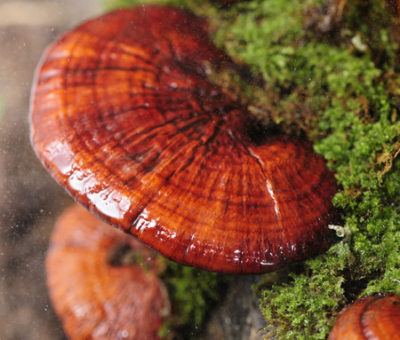All edible mushrooms are uniquely healthful foods. They’re a sophisticated form of fungus that is widely regarded as one of the oldest life forms on our planet (so they’ve had plenty of time to perfect their evolutionary adaptations).
Throughout recorded history, they’ve been prized as powerful healing tools, and for good reason. Mushrooms are low in carbohydrates, and packed with essential nutrients like B vitamins, fiber, iron, niacin, potassium, protein, riboflavin, selenium, and zinc.
Reishi mushrooms also contain rare healing compounds like ergothioneine (a powerful antioxidant) and unparalleled immune modulators called beta-glucans (more on these in a bit).
And get this: mushrooms even contain a precursor to vitamin D, and after being exposed to UV light for just five minutes, they provide 100% of the recommended daily allowance of vitamin D!
The real “RDA” for vitamin D is much higher than the official standard, but it’s still remarkable that mushrooms are able to provide such a high level of this essential vitamin (rich food sources of vitamin D are hard to come by).
These properties make any mushroom worthy of being called a healing food, but there are some that far outshine the rest. Those with specifically therapeutic properties are referred to as medicinal mushrooms, and have been prized as healing tools for centuries.
Reishi mushrooms in particular have attracted a lot of attention, due to their wide range of seemingly miraculous healing abilities.
The “king” of medicinal mushrooms
Reishi mushrooms (Ganoderma lucidum) were once considered in ancient China to be the most healing of all natural medicines. Before a method for growing Reishi in controlled settings was devised in 1975, the mushroom was extremely rare in the wild—for this reason, it was reserved in ancient times for royalty, and called “the King’s Medicine.”
A growing method known as spore separation cultivation has made Reishi much more widely available, and yet we’re only just beginning to understand just how valuable these mushrooms are as therapeutic agents. They’ve been in continuous use for nearly 4,000 years—both as a general tonic for optimizing the immune system and increasing longevity, and as a cure for an impressive array of diseases—and now modern medicine is putting these claims to the test.
Take a look at what researchers have discovered…
They provide perfect immune support. The beta-glucans mentioned above, as well as a bevy of other alkaloids, sterols, polysaccharides, and triterpenoids, all bring the immune system into perfect balance. In cases of overactive immune function (i.e. chronic inflammation or allergies), Reishi calms the body’s immune response, and even acts as a natural antihistamine. In cases where the immune system needs a boost, Reishi powerfully activates “killer” T-cells, so that your body is empowered to fight even the toughest of diseases. For this reason, they’re often classified as an adaptogen.
They defend against even “incurable” diseases. In addition to decreasing the frequency of colds and other common illnesses, Reishi mushrooms have been shown to enable the immune system to fight off supposedly incurable viruses—including HIV, many different flu strains, Herpes simplex, Herpes zoster, Hepatitis B, and Epstein-Barr.
They fight cancer (like champs). This same immune-modulating effect makes Reishi mushrooms a potent anti-cancer food. They prevent and fight cancer by boosting the production of cancer-killing cells in the spleen and thymus, by inhibiting cancerous cell proliferation, by increasing the total level of antioxidants that your blood plasma can carry, and by many other mechanisms.[1]
Reishi mushrooms fight cancer (like champs). This same immune-modulating effect makes Reishi mushrooms a potent anti-cancer food.
So how do they do it?
Here’s their secret…
Reshi mushrooms certainly contain more than their fair share of healing compounds. The real secret behind their miraculous healing abilities, though, is that they activate the body’s ability to heal and defend itself. This sort of whole-system, side-effect-free healing is something that’s very hard to find in the allopathic world of Western medicine.
And because they modulate and balance all your body’s systems, Reishi mushrooms usher in all sorts of other benefits too. They’ve been shown to increase the production and transfer of energy at the cellular level (which is one of the properties that makes them so immune-supporting), and thus they’re an excellent treatment for fatigue too.[2]
In fact, there seems to be no limit to their benefits. Studies have shown that they help with asthma and other respiratory issues, positively affect the composition of your microbiome, support the heart, and more. They’re excellent for treating insomnia, migraines and other headaches, diabetes, anxiety, depression, and many other conditions.[3]
If you’re ready to learn for yourself why Reishi mushrooms have been called “the Mushrooms of Immortality,” give them a try.
Seek out a high-quality extract (a 10:1 extract is ideal), or obtain the raw, dried mushrooms and make a tea out of it (the taste is quite bitter, but making the tea from the actual mushroom is definitely an experience worth having at least once).
Like other natural medicines that work as adaptogens, Reishi mushrooms will work best if taken every day, or at least in accordance with a frequent, consistent schedule (though they also work for acute, therapeutic usage). These mushrooms are truly one of Nature’s healing gems…so don’t miss the opportunity to put them to use in your own life.
Apple Cider Vinegar alkalizes the body to inhibit the growth of cancer because cancer can’t survive in an alkaline environment.
References
[1] http://www.ncbi.nlm.nih.gov/pubmed/23468988
[2] http://www.ncbi.nlm.nih.gov/pubmed/15857210
[3] http://onlypurenature.com/reishi-mushroom-the-ancient-medicine-of-kings/






